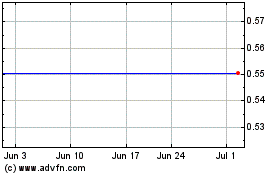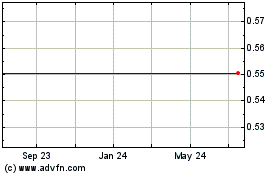Almost Half of Americans Surveyed Admit Healthcare Bills Have Put Them in Debt
October 25 2022 - 8:00AM
Business Wire
- More than a third of U.S. adults who were polled will struggle
or are struggling to pay for healthcare maintenance costs,
emergency needs and private health insurance
- One in 10 Americans (10%) surveyed reveal that they would not
be able to afford any out-of-pocket expenses if they had a health
emergency
- Almost six in 10 Americans (58%) who were polled do not have a
dedicated savings fund for healthcare emergencies
Almost half (46%) of Americans surveyed admit healthcare bills
have put them in debt, according to new research conducted on
behalf of Babylon (NYSE: BBLN), a global digital-first healthcare
company, whose mission is to make high-quality healthcare
accessible and affordable for everyone.
Healthcare premiums are set to increase again this year as are
out-of-pocket expenses. Coupled with inflation and increasing
costs, more than a third (34%) of U.S. adults who were polled will
struggle or are struggling to pay for healthcare maintenance costs,
emergency needs and private health insurance1. These concerns are
most profound among those aged 25-34, with 56% saying they will
struggle or are struggling to pay for healthcare maintenance costs,
while 48% reveal that they will struggle or are struggling to pay
for emergency needs and 55% admit they will struggle or are
struggling to afford private health insurance.
One in 10 Americans (10%), according to the survey, reveal that
they would not be able to afford any out-of-pocket expenses if they
had a health emergency. Meanwhile, 11% would only be able to afford
up to $50 and an additional 11% would be able to afford up to
$100.
According to the Centers for Medicare & Medicaid Services
(CMS), by the end of 2022, out-of-pocket spending growth is
projected to continue accelerating to 6.1% from 4.2% in 20202.
While all U.S. adults are advised to have a healthcare savings
fund, this is not feasible for everyone. Almost six in 10 Americans
(58%) who were polled do not have a dedicated savings fund for
healthcare emergencies, while 38% do.
“The healthcare affordability crisis in the United States is
particularly worrisome given the inflationary economic market,”
said Ali Parsa, CEO and Founder of Babylon. “Patients are
struggling to pay their maintenance costs and a significant number
of people are unable to afford any out-of-pocket medical expenses
in the case of emergency healthcare requirements. The U.S.
healthcare system needs to change to make high-quality healthcare
affordable for people of all income levels. Healthcare is not a
luxury, it’s a basic requirement.”
To combat increasing healthcare costs and to make healthcare
more affordable for Americans, Babylon combines human expertise
with the power of technology. Artificial intelligence (AI) is
helping Babylon scale at a lower cost to big populations. By
utilizing AI, Babylon eases the administrative burden on doctors
and nurses, allowing them to focus on giving patients the best care
possible, to prevent $10 solutions from turning into $10,000
problems.
To further tackle increasing healthcare costs, the Babylon 360
primary care program offers high-quality, continuous health care
that is personalized and easy to use. Our no-cost video
appointments are offered 24 hours a day, 7 days a week in select
markets including urgent, primary care and behavioral health
support. Babylon’s cost-saving efforts were highlighted in a 2021
survey among Babylon 360 members, which identified that more than
40% of consultations had resulted in members avoiding the Emergency
Room or urgent care visits, generating significant cost
savings3.
Notes to Editors
1Unless otherwise stated, all data points cited in this press
release are taken from a survey conducted by One Poll on behalf of
Babylon between August 8 - 15, 2022. 5,000 US adults were
surveyed.
2Centers for Medicare & Medicaid Services (CMS) National
Health Expenditure Projections
3Babylon Eclipses 100,000 U.S. Value-Based Care Members
About Babylon
At Babylon, our mission is to make quality healthcare accessible
and affordable for every person on Earth. To this end we are
building an integrated digital first primary care service that can
manage population health at scale.
Founded in 2013, we are reengineering how people engage with
their care at every step of the healthcare continuum. By flipping
the model from reactive sick care to proactive healthcare through
the devices people already own, we offer millions of people
globally, ongoing, always-on care. And, we have already shown that
in environments as diverse as the developed UK or developing
Rwanda, urban New York or rural Missouri, for people of all ages,
it is possible to achieve our mission by leveraging our highly
scalable, digital-first platform combined with high quality,
virtual clinical operations to provide integrated, personalized
healthcare.
Today, we support a global patient network across 15 countries,
and operate in 16 languages. In 2021 alone, Babylon helped a
patient every 6 seconds, with approximately 5.2 million
consultations and AI interactions. Importantly, this was achieved
with a 93% user retention rate in our NHS GP at Hand service and 4
or 5-star ratings from more than 90% of our users across all of our
geographies. We are working to demonstrate how our model of digital
first integrated primary care can be applied to manage the health
of the population in different settings across Medicare, Medicaid,
and commercial value based care contracts in the US and our primary
care services in the UK.
Babylon is also working with governments, health providers,
employers and insurers across the globe to provide them with a new
digital-first platform that any partner can use to deliver
high-quality healthcare with lower costs and better outcomes. For
more information, please visit www.babylonhealth.com.
View source
version on businesswire.com: https://www.businesswire.com/news/home/20221025005024/en/
Media press@babylonhealth.com
Babylon (NYSE:BBLN)
Historical Stock Chart
From Aug 2024 to Sep 2024

Babylon (NYSE:BBLN)
Historical Stock Chart
From Sep 2023 to Sep 2024
